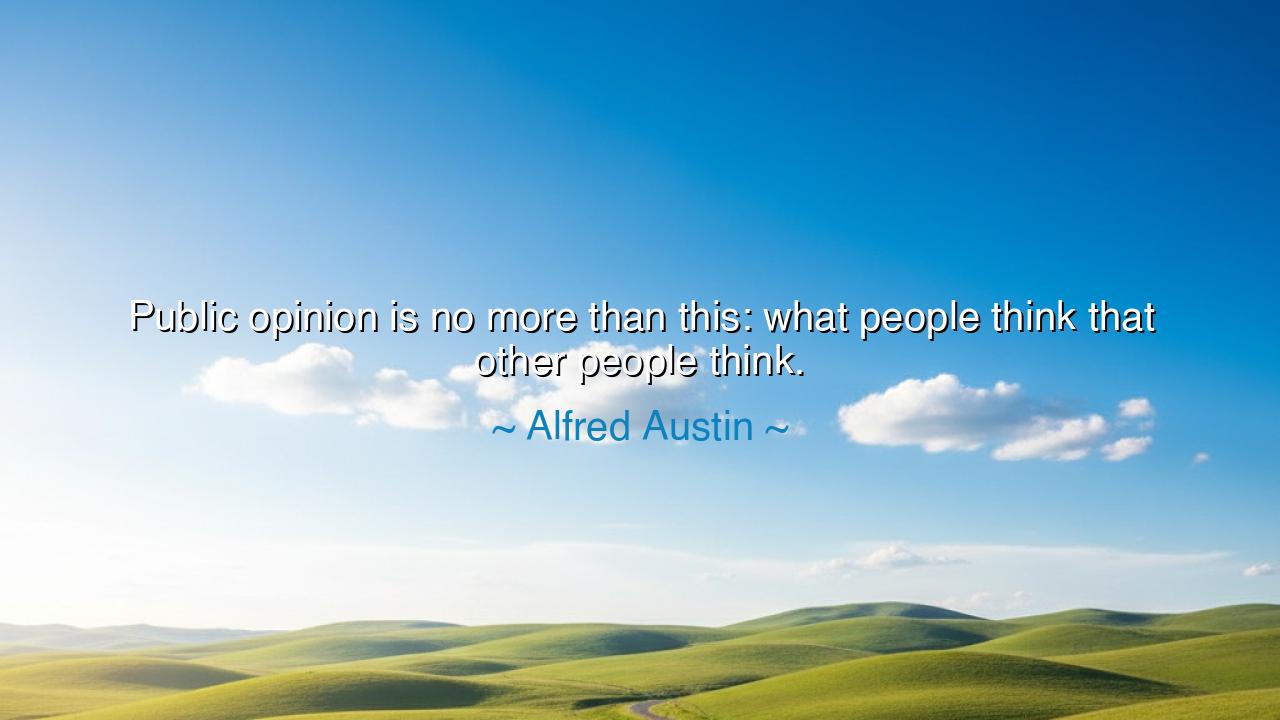
Public opinion is no more than this: what people think that






The poet Alfred Austin, keen observer of human nature, once revealed a profound truth when he said: “Public opinion is no more than this: what people think that other people think.” These words strip away the illusion of a great, unified voice of the masses and reveal it for what it often is—a fragile construct built upon perception, fear, and imitation. Public opinion is not always the collective wisdom of society, but rather a mirror reflecting imagined beliefs, where each person looks to others for guidance and, in doing so, creates a powerful yet often hollow force.
At its core, Austin’s insight exposes how easily human beings are swayed by the belief of consensus. Many do not form their views through deep reflection, but by observing what they believe the majority accepts. When people fear being cast out or ridiculed, they conform outwardly, even when their hearts whisper otherwise. Thus, public opinion can grow like a storm cloud, dark and overwhelming, not because everyone truly agrees, but because everyone assumes everyone else does. This is the root of its strange and often dangerous power.
History provides a dramatic example in the Salem witch trials of 1692. In that small Puritan town, fear and suspicion spread like wildfire. Few truly believed their neighbors were witches, yet none dared to speak against the accusations, for to do so was to risk being accused oneself. Each person watched the others, mistaking their silence and compliance for genuine belief. In this way, a false public opinion took hold, leading to the execution of innocent lives. Here we see how dangerous it can be when people follow what they think others think, rather than standing firm in truth.
The same pattern has appeared in the great revolutions of history. Before the fall of the Berlin Wall in 1989, many citizens of East Germany privately despised the regime, yet they felt alone in their dissent. They believed their neighbors supported the government, while their neighbors believed the same of them. When at last a few brave voices dared to cry out for freedom, the illusion shattered. The people discovered that the majority had long shared their yearning, and the mighty structure of oppression collapsed almost overnight. This moment revealed how fragile public opinion can be when built only on imagined agreement.
Let this wisdom be carried forward: question the tides of public opinion, for they are often shaped not by truth, but by perception. Have the courage to seek your own understanding, and to speak when silence serves only falsehood. For as Austin teaches, the crowd’s voice is often an echo chamber, and its apparent strength may dissolve like mist when faced with the light of honesty. True progress begins when even one soul dares to stand apart and think not of what others might think, but of what is right and just.






TABach Thi Anh
There’s a sharp irony in this statement that I love. It turns the idea of ‘the voice of the people’ upside down, showing how fragile and self-referential it can be. It makes me wonder, do we ever really know what others think, or do we just project our fears and assumptions? Maybe public opinion isn’t a measure of truth but of how successfully people guess and mimic social expectations.
HVHung Vo
This quote exposes something deeply psychological about human behavior—the power of conformity. It reminds me of how social validation shapes everything from politics to pop culture. But it also makes me uneasy. If public opinion is just a hall of mirrors, how can truth ever prevail in public discourse? Perhaps Austin is warning us that collective thinking can be more about perception than reason.
DDuyen
I find this observation both cynical and brilliant. It implies that people often base their views not on conviction but on assumptions about what’s popular. That makes me question how democratic opinion really is. Are we collectively shaping society, or just echoing imagined norms? Maybe real courage today lies in forming independent thoughts even when they contradict what we think others believe.
NT9a4.Trinh Ngoc Tram
This quote feels incredibly relevant today, especially in the age of social media. It suggests that much of what we call ‘public opinion’ isn’t genuine belief but a reflection of perceived consensus. That’s a bit unsettling—how often do people actually think for themselves? It makes me wonder if true public opinion even exists, or if it’s just an illusion created by our desire to fit in and avoid standing out.